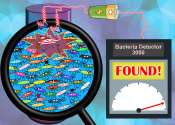Researchers develop battery-less chemical detector
(PhysOrg.com) -- Unlike many conventional chemical detectors that require an external power source, Lawrence Livermore researchers have developed a nanosensor that relies on semiconductor nanowires, rather than traditional ...








